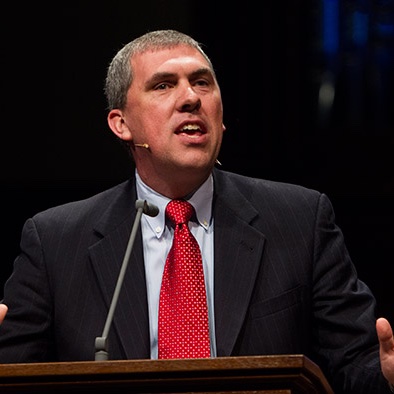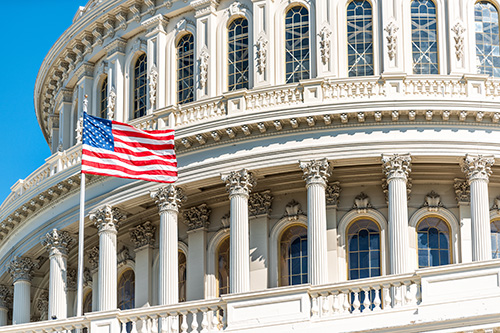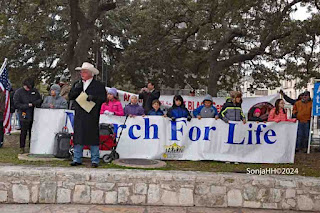I’m An Evangelical Pastor Who Plans To Vote For Trump; Here’s How He Could Lose Me
 The following article was authored by Bart Barber and first published in the Washington Post. Bart Barber is a pastor at First Baptist Church of Farmersville, TX.
The following article was authored by Bart Barber and first published in the Washington Post. Bart Barber is a pastor at First Baptist Church of Farmersville, TX.
President Trump has followed through on many key commitments to evangelicals: championing the cause of the unborn, protecting religious freedom, standing with Israel and nominating two excellent justices to the Supreme Court. But when it comes to immigration, if he continues to follow the advice of senior policy adviser Stephen Miller, he risks alienating his evangelical base in 2020.
Evangelicals sometimes get labeled as anti-immigrant, because most are against illegal immigration, viewing it as inconsistent with a biblical view of submitting to the law. But most of us strongly support legal immigration — which is actually helping to revitalize American evangelicalism, as many immigrants are Christians and many others embrace the gospel upon arrival.
Plenty of evangelicals are solidly behind the president’s commitment to build a wall. But we also trust his commitment that he is “very strongly” supportive of legal immigration and does not want to reduce net immigration levels. When the president declared in February’s State of the Union address that he wanted legal immigration in “the largest numbers ever,” evangelicals cheered.
But Miller — who did not write that ad-libbed line in the speech — clearly has a different agenda, pushing cuts to legal immigration at every turn, often successfully.
Of particular concern to evangelicals is the stark reduction in the number of persecuted Christians allowed to find safety and religious freedom in the United States as refugees. We hear the testimonies of persecuted Christians in our churches and we pray for these people — they matter to us.
In his first week as president, in an interview with the Christian Broadcasting Network, Trump promised to facilitate the resettlement of Syrian Christian refugees. But on the very same day, he signed an executive order drafted by Miller that restricted all Syrian refugees, including persecuted Christians.
And it’s not just Syria. The number of Christian refugees fleeing persecution from Iran’s brutal government declined from more than 2,200 in 2016 to just seven last year. The number of Christians resettled from Iraq, where our State Department has acknowledged Christians have been targeted for genocide, has declined by about 95 percent since 2016. Now the administration has announced a further reduction in the number of refugees — Christian or otherwise — to be resettled in the United States in the coming year.
In anticipation of that decision, the U.S. Commission for International Religious Freedom — chaired by conservative evangelical Tony Perkins — urged a return from the recent ceiling of 30,000 back to 95,000 refugees. Leaders from the most prominent evangelical denominations publicly pleaded with the president to reject the advice of those urging him to further reduce refugee resettlement.
But the administration recently announced a maximum of 18,000 refugees for the coming year, and just 5,000 of those spots are reserved for people persecuted for their faith. Even if all 5,000 went to persecuted Christians — and because I believe in religious liberty, I want us to protect those persecuted for other faiths as well — that would be 75 percent fewer than the average number of Christian refugees resettled during the Obama administration from countries where Open Doors USA says Christians face high levels of persecution.
A Republican member of the U.S. Commission for International Religious Freedom has expressed disappointment, but we know what Trump thinks: He “would be happy if not a single refugee foot ever again touched American soil.”
It is not clear why Miller — whose own family fled anti-Jewish persecution and found refuge in the United States more than a century ago — is so virulently opposed to refugees and other legal immigrants, but I’m troubled by the way his rhetoric so consistently mimics that of anti-immigration groups such as the Federation for American Immigration Reform (FAIR).
FAIR’s impetus to restrict immigration (legal or not) reflects the population control ideology of its founder, John Tanton, whose zeal to restrict population growth for environmental reasons also led him to found a Planned Parenthood chapter. Tanton went so far as to call it “unfortunate” that “India has not gone through the same demographic transition” that China achieved with its one-child forced-abortion policy. As Tucker Carlson observes, onetime FAIR board member Garrett Hardin considered abortion, infanticide and ending immigration as means to the same end: stopping population growth. FAIR still shares a board member with Planned Parenthood of Metropolitan Washington, which is affiliated with the largest provider of abortions in the country and anathema to most evangelicals.
I do not know if Miller knows this history or shares these views, but the policies he has championed have closely followed the FAIR playbook, and former FAIR legislative counsel and Miller protege John Zadrozny led the push to zero out the refugee resettlement program.
Miller’s anti-legal-immigration zeal also sabotaged a bipartisan Senate deal forged in February 2018 that would have appropriated $25 billion for a border wall in exchange for a path to citizenship for dreamers, both of which most evangelicals support. The deal fell apart when White House advisers recommended a presidential veto. A primary reason given — that the legislation would not have restricted particular legal immigration avenues — bore Miller’s fingerprints.
As a result, Trump has had to declare a controversial national emergency and draw funding from military projects to build just a fraction of the border fencing that $25 billion would build. The dreamer situation remains unresolved, with the likelihood of a Supreme Court decision on the matter that could leave the Trump administration in the politically unpopular and morally perilous position of deporting dreamers just in time for the November 2020 election.
By allowing Miller to control immigration policy — rather than listening to evangelicals and trusting his pro-legal-immigration instincts — Trump is making a political mistake. Although most evangelicals may not run into the arms of a pro-choice Democratic opponent in 2020, even a small shift in evangelical voting patterns could be fatal for Trump’s 2020 campaign. Had Hillary Clinton received the 26 percent of white evangelical votes in 2016 that Barack Obama did in 2008, rather than her 16 percent share, she would be president today.
The greater political liability, though, is that evangelical voters — who have until now been among the most loyal Trump voters, even as he faces an impeachment inquiry — will simply stay home on Election Day, disgusted both by Democratic positions on abortion and the Trump administration’s abandonment of persecuted Christians, which a shrewd Democratic candidate will highlight in TV ads.
As an evangelical grateful for the president’s leadership in many areas — and concerned that his policies protecting religious liberty and unborn lives could be quickly reversed in a Democratic administration — I believe it’s time for Trump to make a choice. He needs to choose between Miller’s nativist extremism and the values of the evangelical voters who elected him and who hold the best hope for his reelection.
I know that sounds like an ultimatum, but in reality it’s a prayer and a hope — a recognition that there are nonevangelical voices seeking to influence Trump toward bad policies and an earnest plea for him to listen instead to evangelical supporters who are giving him better advice. I’m praying that the next presidential tweet will announce Miller’s departure from the White House and Trump’s decision to revert to a refugee ceiling of 95,000, restoring the U.S. role as a beacon for persecuted Christians and other legal immigrants.








